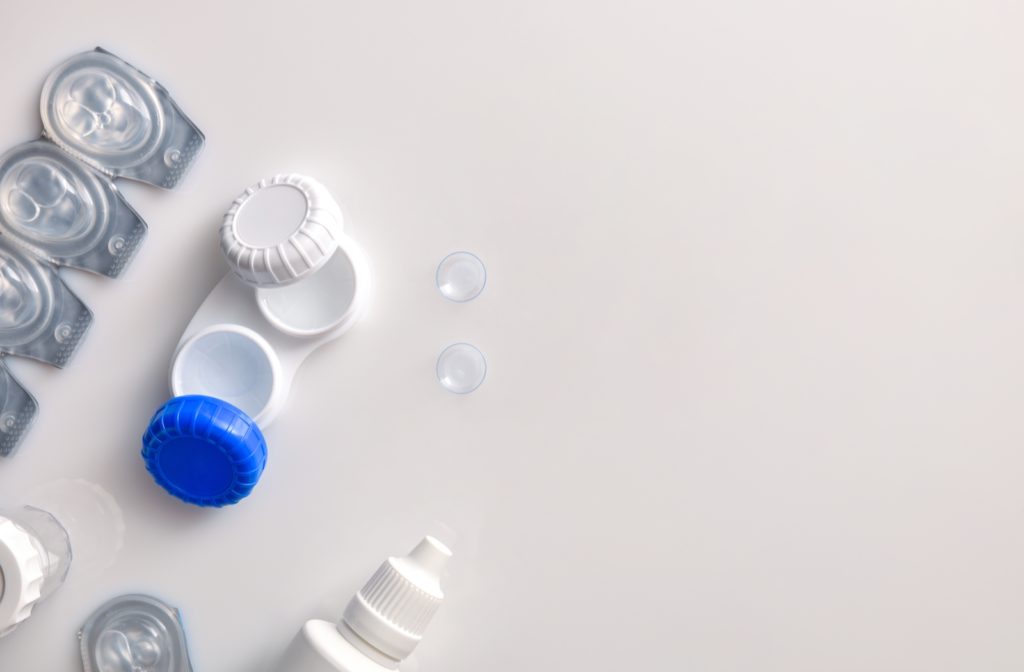We all want to achieve the ideal look, especially if you have vision issues and need prescription glasses or contact lenses. Some people may not want to go down the prescription glasses route and opt for contact lenses.
Contact lens safety is an important topic to explore, especially with daily contacts, which are a popular and convenient option for many.
Let’s look at daily contact lenses, some benefits, and if you can wear them more than once.
What Are Daily Contact Lenses?
Contact lenses are versatile and come in various types. Daily contacts usually fall under the soft contact lenses category, which are the most commonly prescribed contact lenses.
Soft contact lenses can be used to correct vision problems, including:
- Nearsightedness (myopia)
- Farsightedness (hyperopia)
- Blurred vision (astigmatism)
- Age-related loss of close-up vision (presbyopia)
Soft contacts are comfortable and easier to adapt to than rigid gas permeable lenses. The flexible lenses are made of a malleable silicone hydrogel, a material that allows oxygen to pass through to the cornea. Soft lenses are easier to adjust and are ideal for daily wear contact lenses.
Daily contact lenses most commonly fall under the soft lenses category. Daily contacts are one-day lenses designed to be worn for the day and disposed of at night.
Daily contacts can also include:
- Two-week disposable lenses
- Monthly disposable lenses
- Quarterly disposable lenses
With these lenses, you’ll typically remove them at night to clean and continue wearing them in the morning as required.
Contact Lens Safety
Even with daily contact lenses, practicing proper safety techniques with contact lenses is essential. Some people may get lazy, which can be harmful to your eye health.
Some general tips to follow to maintain healthy eyes with contacts:
- Replace contacts as often as your doctor recommends
- Dry your hands well with a lint-free cloth
- Don’t sleep in your contacts, especially daily-wear lenses
- Avoid showering or swimming with your contacts in
- Maintain a consistent eye exam schedule
Practicing good hygiene and replacing contact lenses as recommended are vital to protecting your eyes.
If you run into any issues while wearing your contact lenses feel something isn’t right, look out for these symptoms:
- Pain
- Sensitivity to light
- Discharge from your eye
- Blurry vision
- Red eyes
If these symptoms appear, take out your contact lenses and contact your optometrist immediately to get to the bottom of your issues.
Wearing Daily Contacts More Than Once
Daily contacts are very convenient—they can eliminate the cleaning process and allow you to remove, discard, and hop into bed at the end of the day. There are different types of daily contact lenses, including extended wear contact lenses and disposable contact lenses.
Daily contact lenses that are disposable and single-use only should not be worn more than once after daily usage. Daily contacts that are old can scratch your eye and also cause more dangerous conditions to develop.
Extended wear lenses are available for overnight or continuous wear ranging from one to six nights or up to 30 days. It’s essential to choose contact lenses based on your needs and closely follow the instructions given to you by your optometrist.
Following the proper guidelines laid out in your contact lens prescription is crucial, and ignoring proper contact lens maintenance can result in eye health issues. Avoiding over-the-counter contact lenses before consulting your optometrist is not advised as that can cause complications to your unique vision situation.
Practicing Good Contact Lens Habits
The ideal contact lenses for you come down to your vision situation and overall eye health. Daily contact lenses are a good option for people who want to skip the nightly task of cleaning their contacts, and daily contact lenses also offer an extended wear option.Book an appointment with your optometrist today for more information on daily contact lenses and find the right contact lenses for you.



